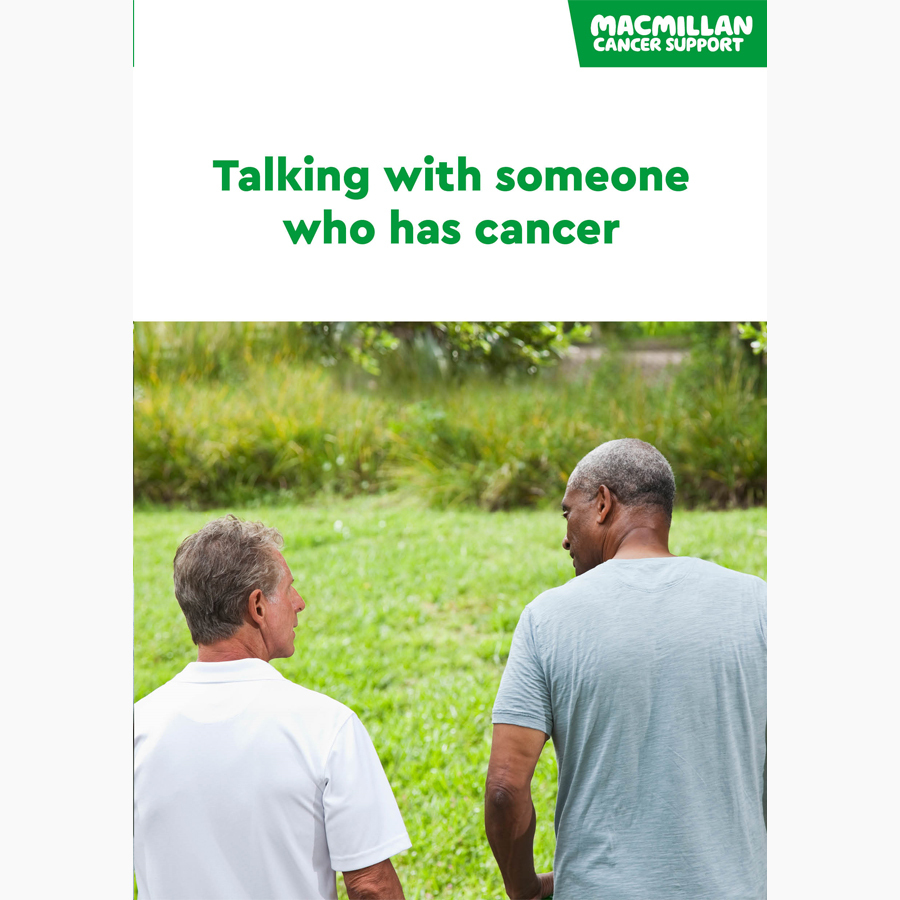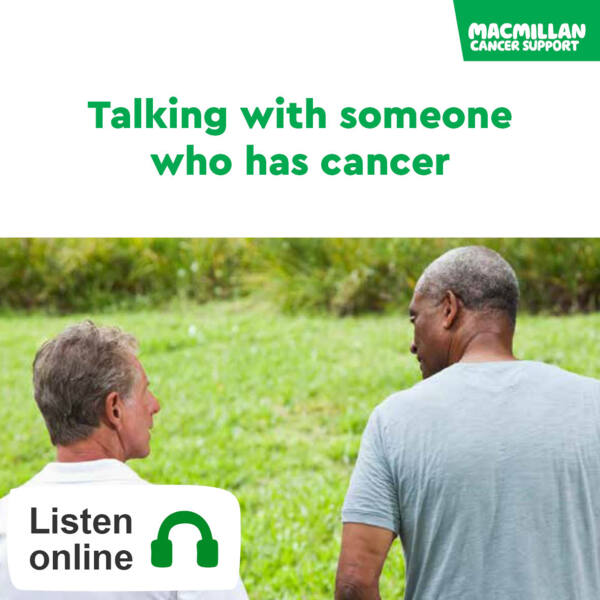How to talk to someone with cancer
You may feel unsure about what to say to someone with cancer. We have advice to help you make talking and listening easier and deal with difficulties.
Tips for talking to someone with cancer
It is natural for someone with cancer to have many feelings, such as fear, anger or frustration. Talking to other people can help them cope with their emotions. You can support the person with cancer by listening and talking with them. This is sometimes difficult, but the following things can make it easier.
- Do not try to talk when one of you is busy or tired.
- Choose a time and place when you will be able to talk without being interrupted. But remember that sometimes, one of you may want to talk without planning it.
- Talking about feelings can be tiring. Set a limit on how long you will talk for. You could plan to do something nice together afterwards.
- When the person with cancer is talking, pay attention to what they are saying. Try to listen instead of thinking about what you are going to say next.
- Do not feel you have to talk about the cancer. Let your partner, family member or friend talk when they are ready.
- Respect the other person’s feelings. They might want to talk about things you find hard to hear.
- It may not be helpful to tell the person about other people’s stories. Cancer is different for everyone.
- Showing empathy is helpful. If they start to cry as they talk, you could say something like, ‘I can see how upsetting this is for you’. Or you could simply sit with them and hold their hand.
- Try not to say that everything will be fine or encourage them to be positive. It is better to let people speak honestly about their feelings.
- Try to repeat back what you have heard. This helps you check you have understood things correctly and shows you are listening.
- You might say things like, ‘So you mean that…?’.
Booklets and resources
Listening to someone
Listening is just as important as talking. We all like to feel we have been heard, especially when talking about something serious.
You may feel unsure about how to comfort the person you care for. But just listening to them when they want to talk can make a real difference. Silences do not need to be awkward. They give you a chance to focus your thoughts and reflect on what has been said. You do not need to have all the answers. Listening can be enough.
Listening and talking can help you both understand what the other person is feeling.
Related pages
Dealing with difficulties
When you are supporting someone with cancer, you may both feel stressed. You may be angry or upset about the cancer, but this can be hard to express. People might express how they feel by getting angry or upset with the people they care about the most. You may argue or find it difficult to talk to each other.
There are things you can do to help manage this:
- Try to understand each other’s feelings.
- Ask the other person what they think or how they feel. It might be different to what you thought.
- Allow each other to talk, even if you disagree with what the other person is saying.
- Avoid words like ‘never’ and ‘always’. For example, do not say ‘You never listen to me,’ or ‘I always call you’. These words can make the other person defensive.
- Talk to the other person about how what they do makes you feel. Instead of saying, ‘You are thoughtless – I have to remember everything’, try saying, ‘I feel stressed when I have a lot to remember’.
- Write down your feelings. This can help you think about what is important to you and help you deal with some of your worries.
Related pages
Not talking
It is also important to have conversations about things other than cancer. There will be times when you prefer to talk about everyday subjects such as friends, sport, hobbies or TV. Or sometimes you may just want to sit quietly together. It is okay not to talk all the time.
There may be times when you want to talk but the other person does not. When this happens, talking to family members or friends may help you feel supported. It is good to have support from other people as well as from each other. Macmillan is also here to support you. If you want to talk, you can:
- Call the Macmillan Support Line for free on 0808 808 00 00.
- Chat to our information and support specialists online.
- Visit our Online Community to talk to other people who have a family member or friend with cancer.
We have more information about how to talk about your feelings and getting the support you need.
About our information
This information has been written, revised and edited by Macmillan Cancer Support’s Cancer Information Development team. It has been reviewed by expert medical and health professionals and people living with cancer.
-
References
Below is a sample of the sources used in our cancer and emotions information. If you would like more information about the sources we use, please contact us at cancerinformationteam@macmillan.org.uk
National Institute for Health and Care Excellence (NICE). Supporting adult carers. NICE guideline [NG150]. Published 22 January 2020. Available from www.nice.org.uk/guidance/ng150 [accessed Jan 2023].Zeng Q, Ling D, Chen W, et al. Family Caregivers’ Experiences of Caring for Patients with Head and Neck Cancer. A systematic Review and Metasynthesis of Qualitative Studies. Cancer Nursing. 2023; 46,14-28. Available from doi.org/10.1097/ncc.0000000000001096 [accessed Jan 2023].
Date reviewed

Our cancer information meets the PIF TICK quality mark.
This means it is easy to use, up-to-date and based on the latest evidence. Learn more about how we produce our information.
The language we use
We want everyone affected by cancer to feel our information is written for them.
We want our information to be as clear as possible. To do this, we try to:
- use plain English
- explain medical words
- use short sentences
- use illustrations to explain text
- structure the information clearly
- make sure important points are clear.
We use gender-inclusive language and talk to our readers as ‘you’ so that everyone feels included. Where clinically necessary we use the terms ‘men’ and ‘women’ or ‘male’ and ‘female’. For example, we do so when talking about parts of the body or mentioning statistics or research about who is affected.
You can read more about how we produce our information here.






